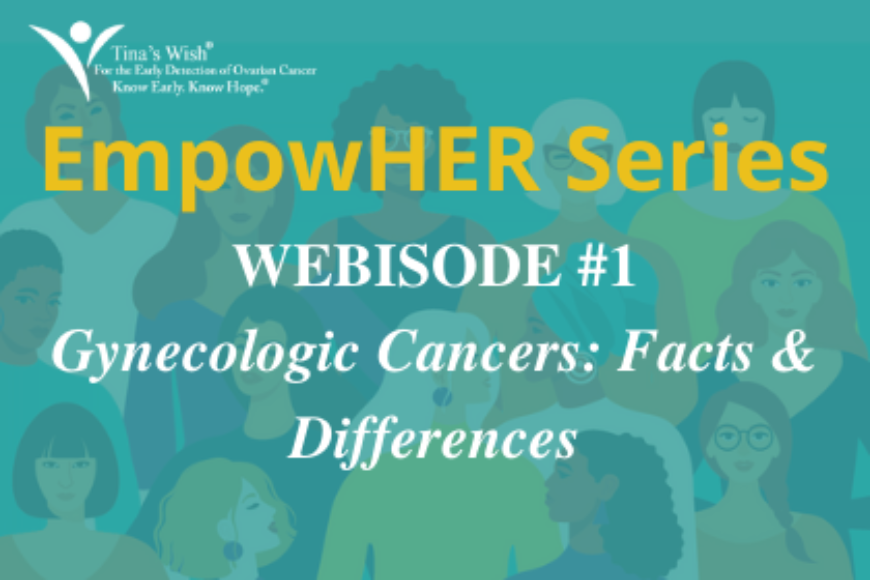EmpowerU Series: Gynecologic Cancers: Facts & Differences

The Tina’s Wish EmpowerU Series is available wherever you listen to podcasts, or at the link HERE.
The Tina’s Wish EmpowerU Series educates and empowers women in relation to their gynecologic health.
Knowledge is power! We welcome everyone to join us on this inclusive journey.
To watch with Spanish subtitles, CLICK HERE.
For all EmpowerU episodes, CLICK HERE.
For additional resources, CLICK HERE.
Additional Resources
- For answers from this webisodes Q&A, CLICK HERE.
- For more information about gynecologic cancers, please visit the CDC website HERE.
- For gynecologic cancer resources for patients & families, CLICK HERE.
- For a quiz to see if you are at an elevated risk for hereditary cancers, CLICK HERE. (For informational purposes only. This quiz is not intended as, and therefore should not be interpreted as, medical advice, professional diagnosis, or medical opinion.)
To make a donation in support of the Tina’s Wish mission and our researchers, please CLICK HERE.
Tina’s Wish is currently seeking Community Partners and Sponsoring Partners. Community Partners participate in outreach and communication to their communities so that their constituents can benefit from the complimentary programming. Sponsoring Partners provide support to the Tina’s Wish mission.
Community Partners

Sponsoring Partners
Leadership Sponsors
For more information about the EmpowerU Series or Community and Sponsoring Partner opportunities, please download the brochure CLICK HERE or contact Beverly Wolfer, bwolfer@tinaswish.org.
To be added to our mailing list for EmpowerU Series updates, CLICK HERE.
To learn more about Tina’s Wish research, CLICK HERE.
Q&A chat questions that went unanswered during Webisode #1
Please note that responses cannot address specific, personal issues. Replies provided by a team of gynecologic oncologists and various medical websites. Please note that the information contained below is for awareness purposes only and does not constitute medical advice. Please be in consultation with your doctor (primary care physician or gynecologist) on any issues of concern to you, a family member or friend.
CANCER DETECTION
I have BRCA2 and have had preventative surgeries to remove fallopian tubes and breast tissue. What steps do I need to take to monitor risk of other gynecologic cancers like cervical, vulvar and uterine?
- Please be in consult with your doctor to determine if you are at an elevated risk for any of the other gynecologic cancers.
- All women should review the Signs & Symptoms for gynecologic cancer and reach out to their gynecologist or primary care physician if a symptom persists for more than two (2) weeks.
Is there a blood test that can detect cancer cells?
- Unfortunately, there is no one blood test that can detect all cancers or even just gynecologic cancers. Tina’s Wish is dedicated to funding scientific research for the early detection of ovarian cancer. Know Early. Know Hope.® This is our goal! Click here to learn more about the Tina’s Wish funded research for the early detection of ovarian cancer.
Can the irregular bleeding symptom for these cancers even occur for women who are on birth control?
- Yes. Any abnormal bleeding should be evaluated by a doctor.
If a patient has scar tissue, what tests can be ordered to make sure the new cancer is not hiding behind the scar tissue?
- As your doctor knows your personal history best, this is a good question to discuss with them.
Why are transvaginal ultrasounds not part of a woman’s annual checkup?
- Transvaginal ultrasounds are very useful for evaluation of abnormal findings or symptoms. They have not been shown to be an effective screening tool or reliable method of detecting early stage disease. We are hopeful that some of the currently funded research will result in a test that is truly detecting ovarian cancer at its earliest stage.
Click here to learn more about the Tina’s Wish funded research for the early detection of ovarian cancer.
Are these cancers more or less common for women who are in menopause?
- Uterine and ovarian cancer are the two most common gynecologic cancer for women in menopause.
Do you recommend being seen by a primary care physician or a gynecologist for one’s annual pap smear?
- If you have no pressing health concerns or specific gynecologic complaints, then seeing your primary care provider — an internist or family doctor — for routine gynecologic examinations could make sense for you. Depending on their practice, they may offer pap smears, STD screening and breast exams.
- If you receive any abnormal test results in relation to your gynecologic health then reaching out to a gynecologist is appropriate for more specialized care.
My mother is having a pelvic/abdominal CT scan ordered by her urologist for some symptoms (frequent urination, blood in urine). Would you recommend that we also have her CT scan image sent to her gynecologist? Also, is the CA-125 blood test you mentioned performed upon request or is it part of routine blood work?
- There is no downside to having one’s gynecologist be included in the loop for the test results.
- A CA-125 is ordered by a doctor. The CA-125 blood levels can be increased in ovarian cancer and other cancers including: uterine, fallopian tube and pancreatic. Please note, that CA-125 levels can be elevated for women as a result of factors that have nothing to do with cancer.
- A CA-125 test may be ordered if there are gynecologic cancer signs and symptoms present.
OVARIAN CANCER
How long does it take from the beginning of ovarian cancer until it’s stage IIIC? Months or years? Is it possible to have slow growing ovarian cancer over a period of time?
- The answer to this question is not known, and likely is different in different people.
My daughter was diagnosed at age 10 with Ovarian Germ Cell cancer. While she had all the symptoms it is not generally discussed. Would you please discuss so other parents are aware.
First, we are sending our best wishes to you and your family that your daughter has had or will have a full recovery. Any childhood cancer is difficult and presents unique challenges for the entire family.
- Thank you for reminding us that although the majority of ovarian cancers affect older women, girls, teens and young women can also be diagnosed with ovarian cancer. Germ cell tumors begin in the reproductive cells (egg or sperm) of the body. Ovarian germ cell tumors usually occur in teenage girls or young women. This type of cancer is one of the rarer types of ovarian cancer.
- To learn more about this specific type of ovarian cancer, please Click Here for further details on the NIH Cancer site.
Is the tumor marker betaHCG an indicator of ovarian cancer?
- BetaHCG can be a marker for cancer, but is more commonly used in diagnosing pregnancy.
What current clinical trials are available for ovarian cancer? I’m in remission and taking Zejula.
- Please discuss clinical trial options with your gynecologic oncologist. Each cancer type, whether one has a genetic mutation, your current stage, recurrence and prior treatment regimen impacts the appropriate clinical trial for each patient.
- Click here to learn more about clinical trials and to find NCI approved clinical trial options.
VULVAR CANCER
Can vulvar cancer be detected by a physical exam? How long does it take from the beginning of vulvar cancer until later stages?
- To diagnose vulvar cancer a pelvic physical examination is required and most importantly a biopsy (a tissue sample) will be conducted.
- Progression from Stage I to later stages in Vulvar Cancer is patient specific and varies between different people. Typically the Signs & Symptoms of vulvar cancer are significant that women are diagnosed in earlier stages.
CERVICAL CANCER
At what age should a woman begin and stop having a pap smear for the early detection of cervical cancer?
- The guidelines for pap screening are quite complicated, and depend on a person’s risk factors and personal history. This is an excellent question to discuss with your gynecologist. Click here to review the guidelines.
USE OF CA-125
Can doctors do a CA-125 blood test routinely for their patients who are high risk for developing Ovarian Cancer?
- For women in the general risk population, CA-125 has not shown to be a reliable screening test for ovarian cancer. CA-125 levels can become elevated in women during their menstrual cycle as well as for a variety of other reasons.
- A woman who is in a high-risk category for developing ovarian cancer should be in touch with a specialist to determine the appropriate prevention strategies for her individual situation.
GENETIC TESTING
Do you recommend genetic testing for people with a family history of these cancers and/or Ashkenazi Jewish heritage?
- You should discuss the option of genetic testing with your gynecologist and/or primary care provider.
- As we heard during Webisode #1, women with strong family histories of gynecologic cancers should have an in-depth conversation about next steps.
- In the Ashkenazi Jewish populations, 1 in 40 women will be diagnosed with a BRCA genetic mutation. Having the mutation does not mean one will develop the disease; it does mean that one is at an elevated risk for developing certain cancers.
- Webisode #3 airing on April 1st will be focused on the role genetics plays in gynecologic cancers. Click here to be added to our mailing list to learn about future EmpowHER webisodes.
- Click here for a session Tina’s Wish held in the Spring of 2020, Let’s Talk Genetics! Analyzing Your Risk for Developing Ovarian & Breast Cancer.
I did not test positive for BRCA1 or BRCA2. They sent my sample to two (2) independent labs. However, Breast and Ovarian cancer runs in my family. I took birth control for 20 years and I’ve had 4 children. Plus, I breast fed 2 of my 4 kids for 6+ months each. Am I in a high risk for developing breast and/or ovarian cancer?
- Genetic testing has become more complex in recent years, with important genetic mutations found in genes other than BRCA. We recommend you discuss your family history with an expert in the field of genetics or gynecologic cancers.
I have two (2) sisters one with ovarian cancer and one with breast and both BRCA negative. No other family history. Should their children consider genetic testing and if so when?
- Determining risk is highly individualized and will take into account both genetics and family history. We recommend you discuss your personal situation with an expert in the field of genetics or gynecologic cancers.
BIRTH CONTROL PILLS
For those no longer on birth control but who took them for greater than two (2) years, how long does the decreased risk remain?
- Using oral contraceptives (birth control pills) decreases the risk of developing ovarian cancer for average risk women and BRCA mutation carriers, especially among women who use them for several years. Women who used oral contraceptives for 5 or more years have about a 50% lower risk of developing ovarian cancer compared with women who never used oral contraceptives.
Can birth control pills pose other cancer risks that I should be aware of?
- Birth control pills do have some serious risks and side effects depending on your age and personal history. Women considering taking these drugs for any reason should first discuss the possible risks and benefits with their doctor.
HPV VACCINE
Who should receive the HPV vaccine to help prevent cervical cancer?
- It is recommended that all pre-teens (both male and female) receive the HPV vaccine at approximately 11-12 years of age. The vaccine is now approved in individuals up to age 45. The exact timing should be made in consultation with your doctor based on a multitude of factors.
ADDITIONAL QUESTIONS
How can I get pamphlets on these different types of cancer?
- Please click on the below resources for further information about each gynecologic cancer:
Foundation for Women’s Cancers
Centers for Disease Control
Are cancer patients at increased risk for COVID-19 complications?
- At this time, it is not known whether having a history of cancer increases your risk for severe illness from COVID-19. People who have been treated for cancer in the past may want to discuss their concerns about COVID-19 with their doctors.
Why do doctors often times not take you seriously when you are discussing your health with them?
- If you are not comfortable discussing your health issues with your doctor, you may need to consider finding a new doctor. A doctor is there to listen to your concerns as well as to perform preventative care, diagnostic testing, and treat illness.
- One of the upcoming EmpowHER webisodes will cover how to advocate for yourself as a patient. Click here to be added to our mailing list to learn about future EmpowHER webisodes.



